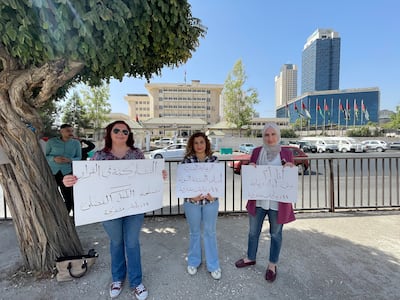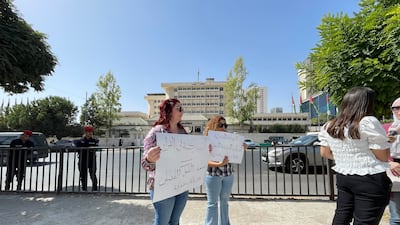Three Jordanian women protested in front of parliament on Sunday against a new law that gives only fathers or male guardians a say over their children’s education.
The provision is one of several amendments made to a child rights bill before it was passed by parliament on Monday.
“I am a mother, not a child-rearing instrument,” read a placard carried by Avin Al Kurdi, one of the three women who responded to the call for a protest that was circulated on social media.

She said the child rights law “comes on top of many other laws that exclude women” in the kingdom of 10 million.
While King Abdullah II is the final authority in most affairs of state, the parliament has some say in deciding social legislation.
Women in Jordan cannot give Jordanian citizenship to their children if the father is a foreigner. A divorced woman who remarries loses custody of her children from the previous marriage, but men who do the same do not. The consent of the father, not the mother, is required for children and minors to travel or to be admitted to hospital.
None of these issues were addressed by the new law. The initial version was modelled on the 1989 UN Convention on the Rights of the Child, but many clauses were removed before the government sent it to parliament, according to the Secretary General of the National Council for Family Affairs, an independent body headed by Queen Rania that played a ley role in drafting the original bill.
Activists say the result is a law that does not provide clarity on a number of issues, such as whether physical punishment of children is allowed, or what constitutes children’s privacy.
Government ministers have portrayed the law less as a rights bill and more as a defining of the state's obligations to provide health care and education for all children, pointing to clauses about the right to education for disabled children.
The law also affirms existing prohibitions on child labour and gives children the right to legal representation if they are apprehended by police or appear in court. It also obliges the ministry of education to take measures to prevent children dropping out of school.
Ms Al Kurdi said the law was “vague”.
She and her fellow protesters stood on the pavement across the street from the parliament building in central Amman. They could have been easily missed in the hustle and bustle of the busy street if it were not for about six policemen and policewomen standing near them, with a police bus parked across the street.
The call for a protest was carried by at least one Jordanian news site, as well as on social media. But no one else joined the protest.
Haneen Assaf, another of the protesters, said many women in Jordan were afraid to speak out against their lack of rights.
“I still think we are speaking for many,” she said. “Women cannot continue be excluded from making decisions when it comes to their children.”


